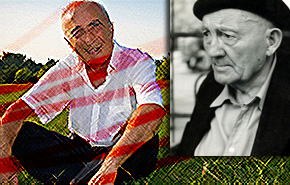Page 1 Page 2 Page 3 Page 4 Page 5

Well, why not? Other people sometimes feigned happiness at the bondage of marriage; maybe some of their delirium was genuine. So, after complex negotiations, they were married and she returned.
Yet joy continued to elude him. She began to take their lives seriously. No longer was she satisfied with everything he did and was. She said the apartment was “seedy” and tormented him until he agreed to move to another one that he could not afford. She hinted he should make more money, as if he had any control over that! Now she rarely seemed to enjoy his clumsy attacks in the dark woods. Once she said: “You don’t give me much of a chance,” and although the remark seemed to be an echo from long past, it was still meaningless, and he ignored it.
In due course, the desired infant was born. It was ugly, odorous, and noisy. It did not acknowledge him, nor add to his pleasure in any way. He cursed himself for a fool, and wore earplugs at night. His wife grew more distant.
He knew then that happiness was far more elusive than he had been led to believe. These ordinary domestic doings were useless in achieving the state of grace he sought. It stood to reason; if it were that simple everyone would know, and no one would need anything else. He sank back into resignation.
One evening, he saw on the trash-strewn street a small band of traveling flower children, their headbands and gaudy clothes brilliant in the sodium lights. An astonishing young girl with heavy black eyebrows stared at his drawn face, and then called out to him as he passed.
“Leave it,” she said. “Come with us. We’re going to Colorado.”
He dropped his head and hurried away. A pimpled boy snickered.
What did she mean by that? Who were these happy, unencumbered children bound for Colorado? How did they dare? What was Colorado — all snow-covered peaks?
His reflections progressed to further curiosities. What other mysterious people lived in worlds unknown to him? What lurked behind the painted plywood of “adult” book stores? How did devotees of deSade actually live their lives? What went on in dope dens? What was it like to live entirely outside the law? Instead of repelling him, these questions seemed to open doors all around him. Since the happiness that had become his life’s fixation was denied him by the correct society he chose, could it be that happiness lay in a forbidden world, forbidden for that reason? Was that the plot?
“Why don’t you ever talk to me?” asked his wife.
“I don’t know,” he mumbled. “Don’t I?”
He approached a group of his associates at their lively coffee break. “Do you fellows still stop at the tavern on your way home?” he ventured. They welcomed him as a prodigal son.
In the dark, masculine bar, he escaped the sameness of his ugly existence. After a few bitter beers, a new sensation introduced itself — it seemed almost a sense of well-being. He returned to the bar, and the sensation time after time. He drew pleasure, actual pleasure!, from the chatter and laughter. He drank more, since the beer appeared to be increasingly diluted. He met women and sometimes went home with one or the other. He ceased drinking the watery beer and switched to more honest fluids. Often he failed to go home at all, thus avoiding the abusive noises emanating from his wife.
One morning, he awoke in the bed of a fat ancient woman old enough to be his mother. Outside he turned left and right, but he could not remember where he was or where to go. He sat on the curb as his stomach leaped horribly. Where was happiness? He had lost it again!
He wandered until he found his way, wandered to the tavern, peered through the smoked glass of the locked door. His nausea increased. He shuffled a block to a liquor store. Open! He carefully carried the bottle in its paper bag around the corner and down a dingy alley. Out of sight of prying eyes, he sat down and drained two inches of relief from its dark brown glassiness.
He awoke to the blinding glare of the sun, cut by surrounding, blindingly black silhouettes. “He’s moving,” said a voice. A high whisper spoke in his aching ear: “We want to help you. Jesus wants to help you.”
A week after he disappeared, his wife threw away his worn toothbrush and moved with her daughter back to her childhood home where, due to the serious inconvenience thus inflicted on her own mother’s midlife affair, she was less warmly received than she expected.
In a kind of primitive village far into the mountains, Elliot became a Christian. His new friends talked and prayed with him, and they taught him how to speak directly with God. He became Mark, and a narrow girl renamed Angel was his special tutor. Since she seemed not of this world, with her patient and sweetly distracted air, he told her of his unhappiness. She taught him renunciation. He learned that he must turn away from temporal affairs and direct his thoughts to the Lord. He learned that no matter what sin had stained his life, he had only to accept Jesus Christ as his personal savior and all his sins might never have existed. He was a new man, a forgiven man.

